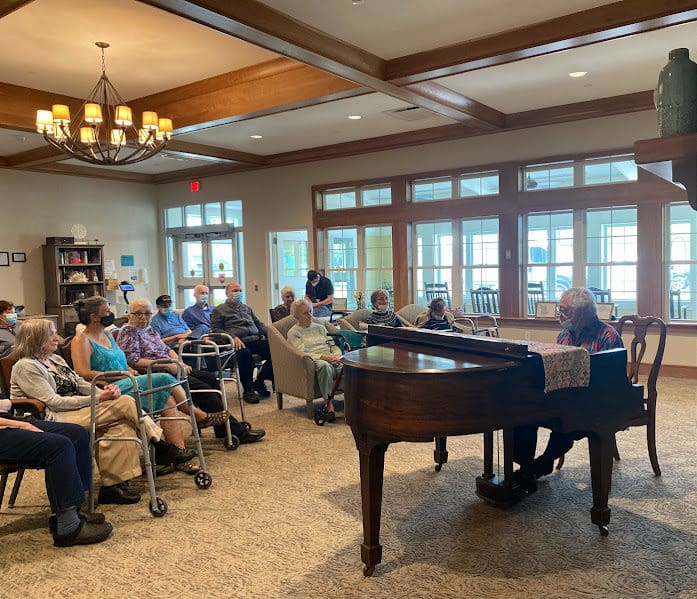
If you were to sit down, close your eyes, and listen to a favorite song, chances are a memory would come to mind. Maybe it would calm you – or bring a smile to your face.
Music often evokes memories and can bring up senses and emotions from past encounters with a song, artist, or instrument. So, it is no surprise that music can be a helpful tool for residents in memory care.
Shannon Loughlin, Director of Recreation at The Nottingham, has seen this firsthand. At The Borer Memory Life Community, located on The Nottingham campus, music is incorporated into the recreation schedule daily. Residents enjoy activities such as:
- Live performers
- Drum circles
- Sing-alongs
- Music trivia
- And more
In Shannon’s experience, music “encompasses the five domains of recreation, engaging residents’ physical, cognitive, emotional, social, and spiritual functions.” For example, it can engage a resident physically while they tap and move with the rhythm or also engage them mentally, reducing anxiety and agitation.
Beyond this, she also says it can trigger memories and help them recall song lyrics. Research suggests that “musical memories are often preserved in Alzheimer’s disease because key brain areas linked to musical memory are relatively undamaged by the disease.”
Because of the research and evidence on the benefits of music for memory – Shannon and her team recently partnered with Interfaith Works to implement their Music and Memory program at The Borer Memory Life Community.
Through this program, residents meet with volunteers one on one to chat about their interests and learn about their personalities. Based on these sessions, the volunteers create multiple individualized playlists for the individual and different needs, such as to soothe and decrease agitation or to energize and excite the resident.
Music can transport us. Shannon shares how it did this for one resident in The Borer Community, “Through this program, one of our residents was able to recall a memory from his teenage years of riding with the top of his car down. The music made him reminisce on his past.”
Music has a special impact on people. It can be used not only for enjoyment but as a form of recreational therapy, a way for people to engage with their minds and bodies.
“Residents enjoy getting together. They hear music, and it engages them. Their mood often changes. You can sometimes see a shift in their whole demeanor.”
Are you looking for a place for your loved one to call home? If you want to learn more about a community where they can live their lives to the fullest while they receive specialized and innovative care. Learn more about Loretto’s Memory Life Communities at: https://lorettocny.org/loretto-life/memory-care/
Resources:
